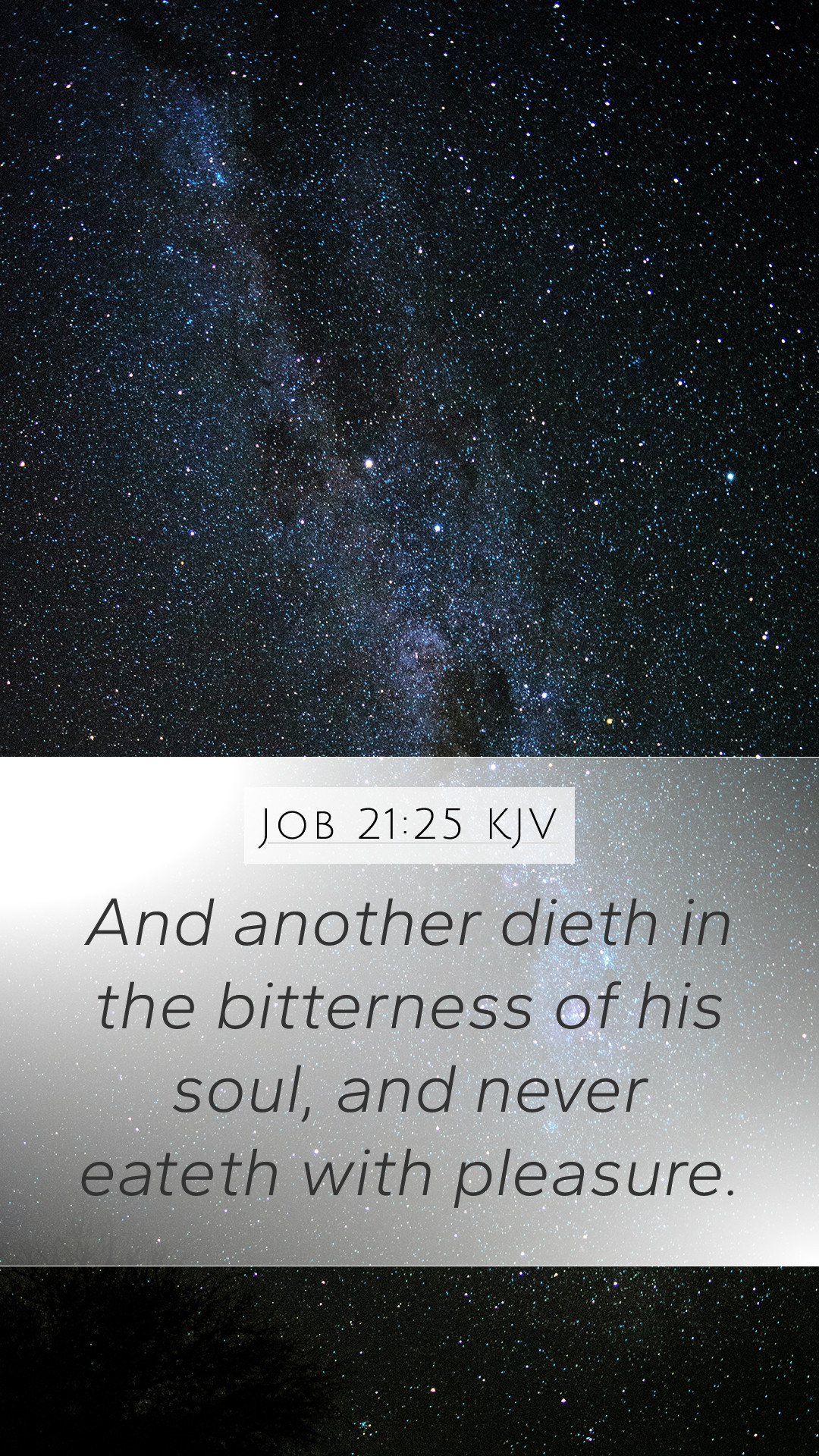Understanding Job 21:25
Job 21:25: "And another dieth in the bitterness of his soul, and never eateth with pleasure."
This verse captures a powerful moment in Job's discourse, presenting a reflection on life, suffering, and the apparent inequality in the human condition. Here is a comprehensive look at its meaning derived from various public domain commentaries.
Bible Verse Meanings
In this verse, Job illustrates the stark reality of two contrasting lives. One individual meets a tragic end filled with sorrow, while others may lead perceived lives of comfort. This reflection serves to critique the understanding of divine justice in the world.
Job's Argument
Job argues against the simplistic view that prosperity is inherently linked to righteousness, while suffering correlates with wickedness. His experience challenges these conventional beliefs, demonstrating that righteous individuals can also endure great pain.
Bible Verse Interpretations
-
Matthew Henry:
Henry highlights Job's lament regarding the fate of the righteous compared to the wicked. He emphasizes that the bitterness of soul faced by some may be far more profound than the outward happiness that others display.
-
Albert Barnes:
Barnes presents this verse as a poignant reminder of the struggle against the perception that prosperity equates to God's favor. He asserts that the heart's bitterness can lead to a perceived abandonment by God, despite one's righteousness.
-
Adam Clarke:
Clarke provides insight into the human experience of despair and questions the traditional understanding of divine retribution. He points out that the lack of pleasure in life can often lead to a deeper existential inquiry into one's purpose and relationship with God.
Understanding Scripture
The context of Job’s suffering is crucial to understanding this verse. Job, a man who lived righteously, faces immense suffering, which raises questions about justice and the reasons behind human suffering.
Key Themes
- The Nature of Suffering: Suffering is a common theme in Job, and this verse illustrates that the righteous are not exempt from pain.
- Existential Reflection: Job's reflections convey a deeper spiritual struggle, leading to questions about the nature of God and suffering.
- Critique of Conventional Wisdom: The verse challenges the accepted notions of reward and punishment in life, illustrating the complexity of divine justice.
Bible Study Insights
For those engaged in Bible study groups or online Bible study, this verse can serve as a point of discussion about the nature of God’s justice and the perplexities of human experience. Consider exploring the following questions:
- How does suffering challenge your understanding of God’s role in the world?
- What examples from your own life reflect the contrast Job describes?
- How can this verse inform your understanding of divine justice and mercy?
Cross References
- Psalms 73:3-4: A reflection on the apparent prosperity of the wicked.
- Ecclesiastes 2:22-23: The vanity of labor without joy.
- James 5:11: The endurance of Job as an example of patience in suffering.
Conclusion
In conclusion, Job 21:25 serves as a profound reminder of the complexities of human suffering and divine justice. Understanding this verse requires reflection on both personal experiences and broader biblical themes.
Through careful Biblical exegesis and scripture analysis, believers can gain valuable insights into the meaning of Bible verses, including this poignant reflection from Job. Engaging with this text offers opportunities to deepen one’s faith and understanding of life’s challenges.


